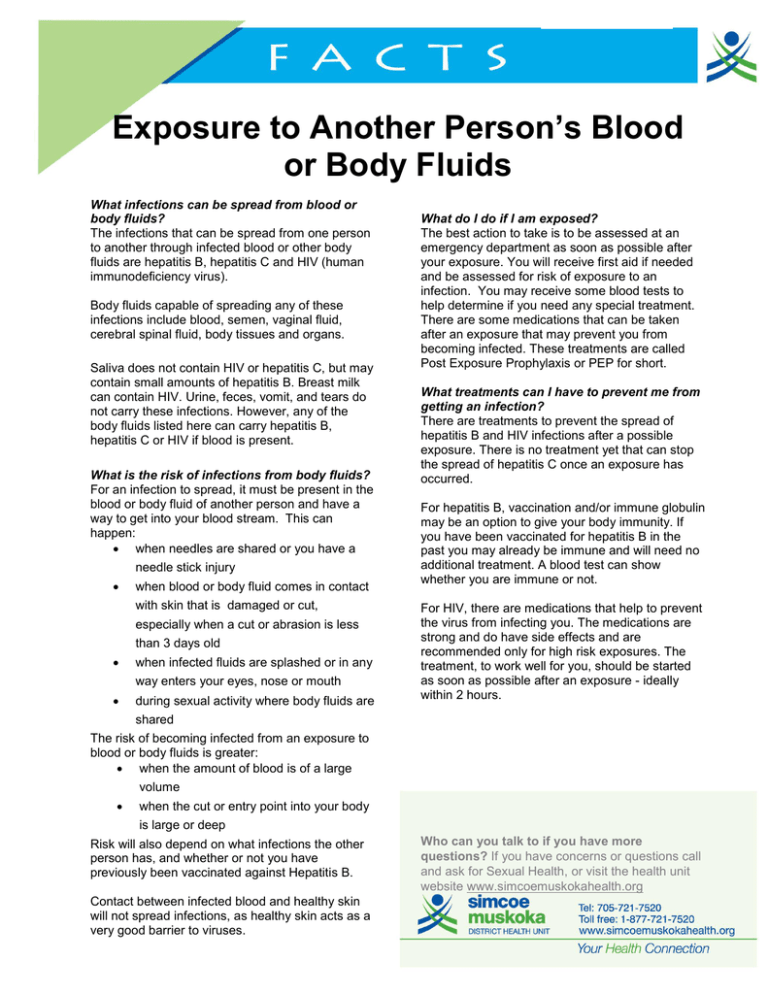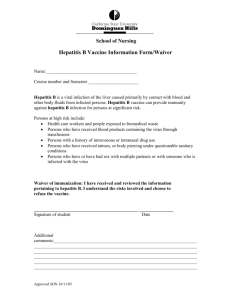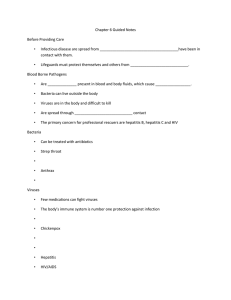
Exposure to Another Person’s Blood
or Body Fluids
What infections can be spread from blood or
body fluids?
The infections that can be spread from one person
to another through infected blood or other body
fluids are hepatitis B, hepatitis C and HIV (human
immunodeficiency virus).
Body fluids capable of spreading any of these
infections include blood, semen, vaginal fluid,
cerebral spinal fluid, body tissues and organs.
Saliva does not contain HIV or hepatitis C, but may
contain small amounts of hepatitis B. Breast milk
can contain HIV. Urine, feces, vomit, and tears do
not carry these infections. However, any of the
body fluids listed here can carry hepatitis B,
hepatitis C or HIV if blood is present.
What is the risk of infections from body fluids?
For an infection to spread, it must be present in the
blood or body fluid of another person and have a
way to get into your blood stream. This can
happen:
when needles are shared or you have a
needle stick injury
when blood or body fluid comes in contact
with skin that is damaged or cut,
especially when a cut or abrasion is less
than 3 days old
when infected fluids are splashed or in any
way enters your eyes, nose or mouth
during sexual activity where body fluids are
shared
The risk of becoming infected from an exposure to
blood or body fluids is greater:
when the amount of blood is of a large
volume
What do I do if I am exposed?
The best action to take is to be assessed at an
emergency department as soon as possible after
your exposure. You will receive first aid if needed
and be assessed for risk of exposure to an
infection. You may receive some blood tests to
help determine if you need any special treatment.
There are some medications that can be taken
after an exposure that may prevent you from
becoming infected. These treatments are called
Post Exposure Prophylaxis or PEP for short.
What treatments can I have to prevent me from
getting an infection?
There are treatments to prevent the spread of
hepatitis B and HIV infections after a possible
exposure. There is no treatment yet that can stop
the spread of hepatitis C once an exposure has
occurred.
For hepatitis B, vaccination and/or immune globulin
may be an option to give your body immunity. If
you have been vaccinated for hepatitis B in the
past you may already be immune and will need no
additional treatment. A blood test can show
whether you are immune or not.
For HIV, there are medications that help to prevent
the virus from infecting you. The medications are
strong and do have side effects and are
recommended only for high risk exposures. The
treatment, to work well for you, should be started
as soon as possible after an exposure - ideally
within 2 hours.
when the cut or entry point into your body
is large or deep
Risk will also depend on what infections the other
person has, and whether or not you have
previously been vaccinated against Hepatitis B.
Contact between infected blood and healthy skin
will not spread infections, as healthy skin acts as a
very good barrier to viruses.
Who can you talk to if you have more
questions? If you have concerns or questions call
and ask for Sexual Health, or visit the health unit
website www.simcoemuskokahealth.org
How can I find out if the other person is
infected?
What are the precautions I should take to
protect others?
If you are worried that the person you’ve been
exposed to (source person) has hepatitis B, C or
HIV you may be able to ask that person to
voluntarily have a test and share the results.
Follow these precautions for at least 6
months or for the time period your health
care provider has advised, until all your
blood test results are known
However, you should know that if the person was
very recently infected, it may be too soon to detect
the infection.
For this reason, you should keep in mind that a
negative result does not always mean the person
is free of infection. It is important for you to have
your own tests done.
The health care provider providing your care will
advise you about what tests you should have and
when you should have them done.
Do not let your blood or body fluid get on
another person
Tell your sexual partners they could be at
risk.
Abstain from having sex or use condoms
during sex (including oral, vaginal and/or
anal sex).
Avoid becoming pregnant during this time
Do not share a razor, toothbrush, nail file
or tweezers.
Do not share needles or drug equipment
with anyone
Do not donate blood, semen, organs and
tissues.
See your health care provider if you
develop any of these symptoms in the 6
months following your exposure: fever,
What if the other person refuses to be tested?
There is a law called the Mandatory Blood Testing
Act that allows some people in specific situations
to submit an application to ask that a source
person be ordered to provide a blood sample that
will test for hepatitis B, C and HIV. You can learn
more about this at the web site for the Ministry for
Community Safety and Correctional Services:
http://www.mcscs.jus.gov.on.ca/english/LinksReso
urces/MandatoryBloodTesting/blood_testing.html
This application must be submitted within 7 days of
your exposure, and can take some time to be
processed (likely days to weeks); it is important not
to wait for this application to start any treatment or
testing your health care provider recommends at
the time of your exposure.
What should I do after possible exposure?
It is very important for you to make sure you go for
any follow-up testing recommended. You should
speak to your health care provider about what you
should do to protect others while you are waiting
for your follow up tests.
rash, jaundice (yellowing of skin or eyes),
nausea or upset stomach, lack of appetite,
vomiting, tiredness, muscle aches, swollen
glands
Who can you talk to if you have more
questions? If you have concerns or questions call
and ask for Sexual Health, or visit the health unit
website www.simcoemuskokahealth.org
If you have experienced an exposure to
another person’s blood or body fluids, it is
important that you be assessed by a health
care provider to determine your risk of
infection and to get appropriate and timely
treatment to help prevent transmission of
hepatitis B, hepatitis C and HIV.



